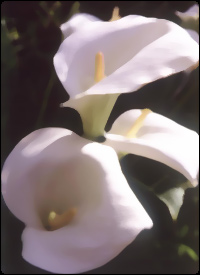Tributary
Created | Updated Dec 8, 2005

A couple of hours ago, I learned that a man I knew a little has passed away. I met him just once and long ago. His passing was peaceful. It was always bound to be peaceful.
Before I met this man, I'd heard a lot about him. (I heard it from his brother, who was a colleague at work. I mention this trivial fact, reader, since you and I need facts to root our understanding. It's our limitation.)
I'd heard a lot about him, but I didn't understand much of it. He was described with wonderment. I was very stupid, and dismissed this as a sibling's uncritical devotion. It was because I couldn't accept that a brain-injured man could command anything more than sympathy. Then I met that man.
He had a hole in his head, literally and obviously. I never learned how it got there. I'm sure that explaining that kind of detail wouldn't have mattered much to him. He was too busy discovering the world. He did so every day of his life, and did so anew.
He carried a minimum of facts with him from day to day. He knew his own name, for example. He wouldn't remember yours, because you didn't need one. If he met you again, you would be a fresh person.
It wasn't that he was incapable of remembering. He could remember a lot of stuff if it suited him to do so. That wasn't very often, mind.
When he did remember, it wasn't really remembering. It was being taught something by the mentor who was himself. He seemed to like this mentor a lot — to revere him, even.
On the day I met the man, he told me what he had seen that day. He had seen that he was very like a river.
I didn't quite see how he was like a river. I thought he was like a very bright infant. It didn't occur to him to pretend experience, because he didn't know that he had any. The thing that wasn't at all child-like, though, was his lack of need. I'm struggling for a word for it; that's how rare this virtue is. The absence of covetousness. He just didn't claim anything for himself, anything at all.
I'd been told that he loved artefacts, and hearing their stories, so I brought him some cutlery blanks. I meant him to have them, but instead he studied them assiduously, and then gave them back. It was as if he drank those things. It was if he savoured them and they became part of him. He wouldn't remember the taste, only that it was good. It was enough for him to keep the pleasure of the occasion.
We talked about the gaps between the tines of a fork, waiting to be made. The tines were there in the blank, and so were the gaps. We just couldn't see them yet. I have never looked at a fork in the same way since that day. I can rediscover a fork every time I hold one, just like he could. The fork is the thing that he taught me to drink.
I asked him how it felt to live this way. I asked him several foolish questions of that kind, and we were like two children, or maybe like a child and his grandfather.
Now I know that I will never meet him again. At last I realise that I should have used my time with him more wisely. I distracted myself, trying to grasp the wisdom hidden within simplicity. I never did pinpoint the wetness in the water. But, my, how it sparkled.

